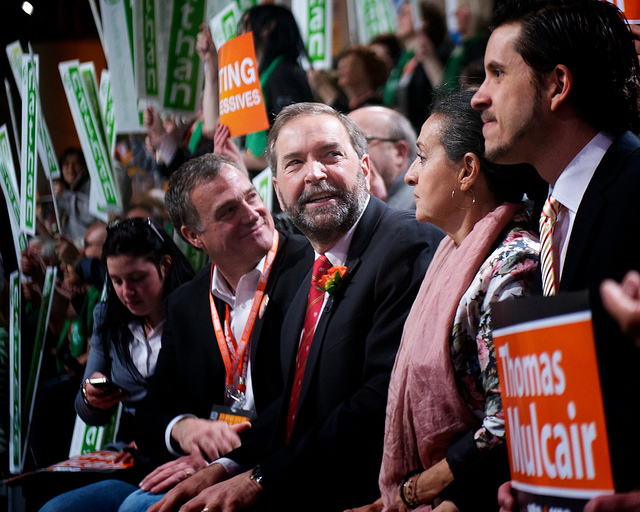Like this article? rabble is reader-supported journalism. Chip in to keep stories like these coming.
An NDP campaign review committee has presented a critique of the party’s performance in last year’s deeply disappointing election campaign, and Tom Mulcair has accepted its main points. This is a good start, but only a start, to the NDP’s present predicament.
My take is a little different. As someone who loudly endorsed Mr. Mulcair for leader, what bothered me so much about the campaign was how many bad judgments he and his advisers made, judgments that were quite clearly off-base at the time.
First, they ignored Jack Layton’s final gift to his party: the theme for the 2015 campaign. Literally on his deathbed, Jack memorably offered the party his last, best advice:
“My friends, love is better than anger. Hope is better than fear. Optimism is better than despair. So let us be loving, hopeful and optimistic. And we’ll change the world.”
Exactly four years later, Mr. Mulcair led the NDP into the most promising election campaign in its 80-year-old history and completely shunned Jack’s inspiration. The entire campaign could have been run on Jack’s five simple sentences, and in fact it was. Except it was Justin Trudeau and his advisers who ran Jack’s campaign, not Tom Mulcair and his.
Instead of a campaign that mobilized NDP activists by making them proud of their party, Mr. Mulcair and his team instead presented a set of ideological conservative propositions that demoralized party members from the get-go. New Democrats were both perplexed and deeply disappointed to find balanced budgets and no deficits to be the major economic policies their leader offered the nation. While activists were passionate about reducing the curse of inequality, the NDP campaign served up knee-jerk neoliberal economics that even mainstream economists had repudiated.
In fact the entire NDP campaign had raised questions literally from the opening gun. After his opening press conference, Tom Mulcair refused to take questions from the media, emulating one of Stephen Harper’s offensive trademarks. It was terribly embarrassing. What was the NDP campaign thinking? No one to this day knows.
And then: Was it really possible that Mr. Mulcair’s team refused to participate in a debate on women’s issues unless the Prime Minister did? What could the campaign have been thinking? The only acceptable NDP answer had been: Yes, we’ll be there. Full stop. But no “there” ever happened. There was only one culprit to blame, and many did.
A serious party revolt was only just avoided. It had, after all, happened to Ontario NDP Leader Andrea Horwath in the 2014 provincial campaign in comparable circumstances. For many New Democrats, primary loyalty is to their convictions, even before their party.
Maybe it was just as well, though. Whenever Mr. Mulcair did debate, he failed to live up to expectations while Justin Trudeau regularly exceeded them. People wanted to know who was advising Mr. Mulcair to offer such low-energy performances — and to patronize Mr. Trudeau so offensively. Many were losing confidence in the campaign team.
And then the party waited for the key campaign message, the theme that would offer Canadians the change they badly wanted and would offer New Democrats the passion they badly needed. As the review committee pointed out, and Mr. Mulcair acknowledged, that overarching theme, beyond promising conservative economic nostrums, never came. Neither did the passion. We still don’t know why.
When NDP support began to plummet, with one month left in the campaign, the team stuck tenaciously to the same conservative dogmas. It was deeply disheartening.
Still, for most New Democrats, Mr. Mulcair’s refusal to join the demagogic racist campaign against the niqab by Mr. Harper and associates was the best moment in the campaign, the one that made them truly proud. Some principles take precedence over political opportunism; this was one of them. Good for Tom Mulcair.
I keep being asked if New Democrats who attend the coming party convention in Edmonton in April will give Mr. Mulcair a vote of confidence. After much thought, my answer surprises even myself: I don’t much care. Given the absence of any obvious alternatives — although you can be sure some would emerge if the need called for it — I guess he may as well stay for a while longer and show us what he can do. But I feel little enthusiasm.
The question of what kind of opposition the NDP under Mr. Mulcair would provide must be answered carefully. First comes the matter of expectations. Does the party present itself as an alternative government, or has that moment in history now vanished again? This needs to be credibly answered.
But deciding how it will function in opposition is not as simple as it may seem. There will be a temptation to be mostly reactive, like the Conservatives, who already reflexively, mindlessly, rage against anything the government does. That’s no role for the NDP.
The country, the world, obviously face major crises, for which new thinking is urgently needed. Democratic socialism has received an unexpected Bernie boost in the United States at the same time that the refugee/immigration crisis has sadly sidetracked social democracy in much of Europe. What does it stand for in Canada?
Is Tom Mulcair thinking about such critical issues? Does he have a plan to restore the party’s confidence in him? We will know soon enough.
Like this article? rabble is reader-supported journalism. Chip in to keep stories like these coming.
Image: Flickr/Matt Jiggins



